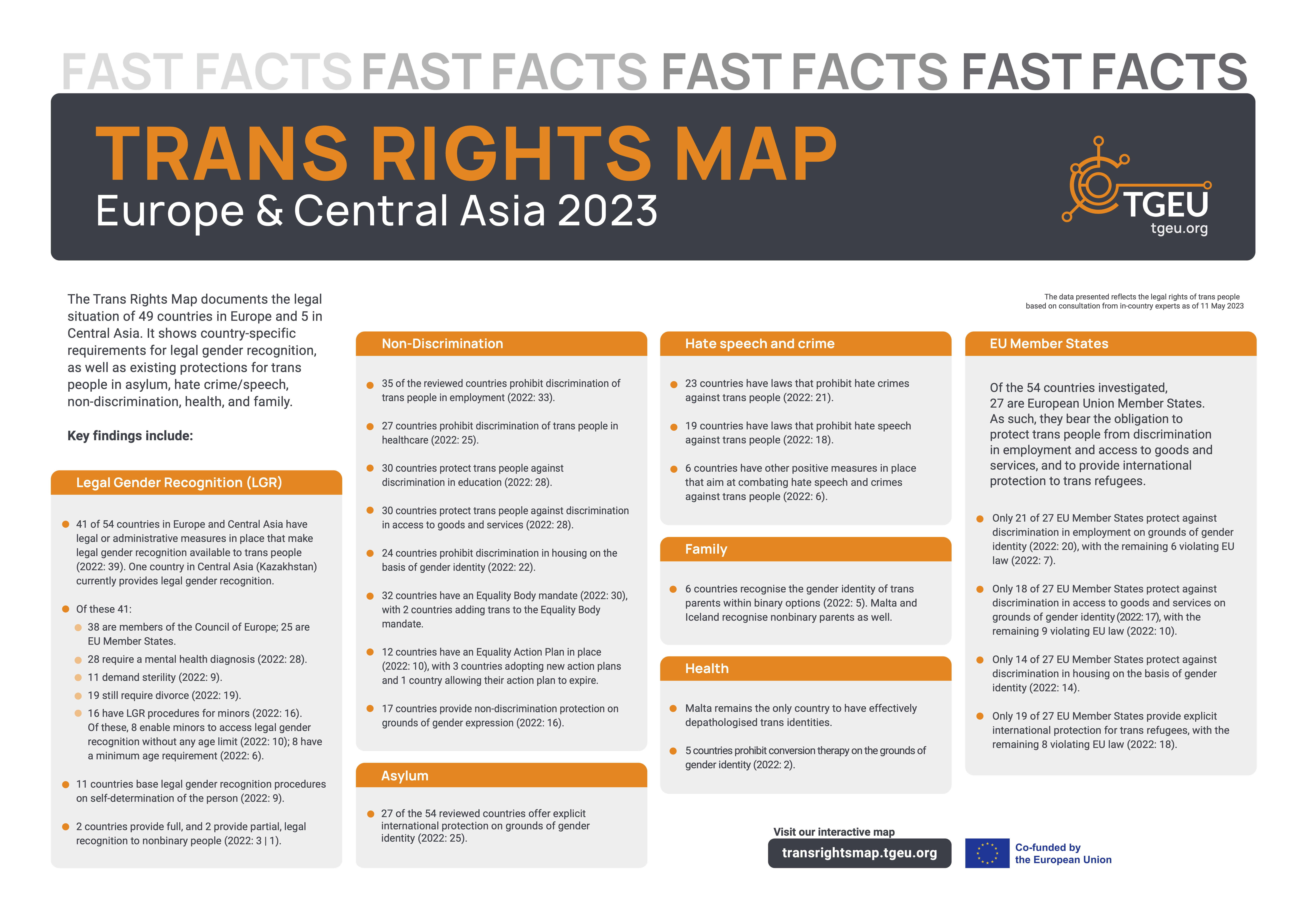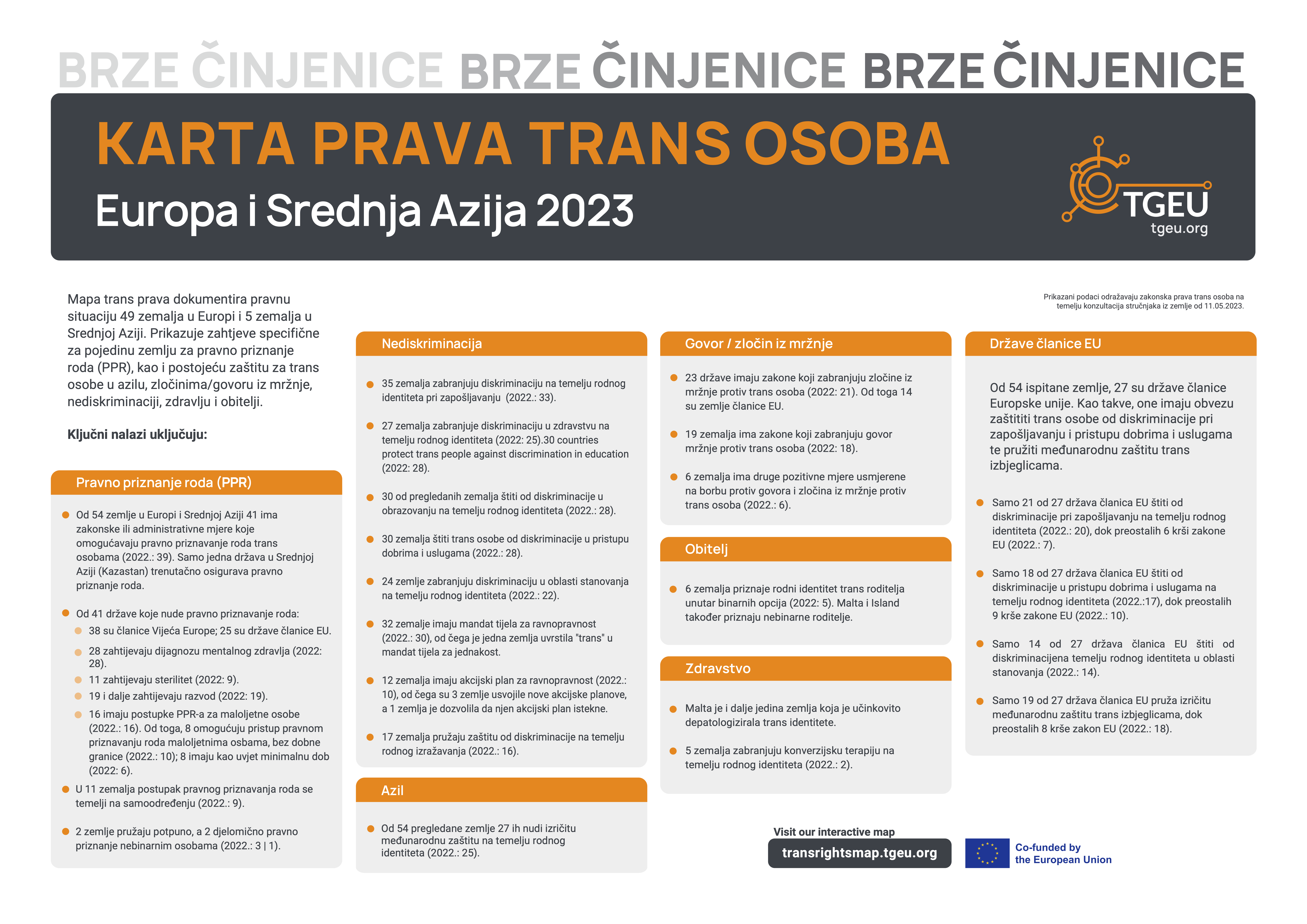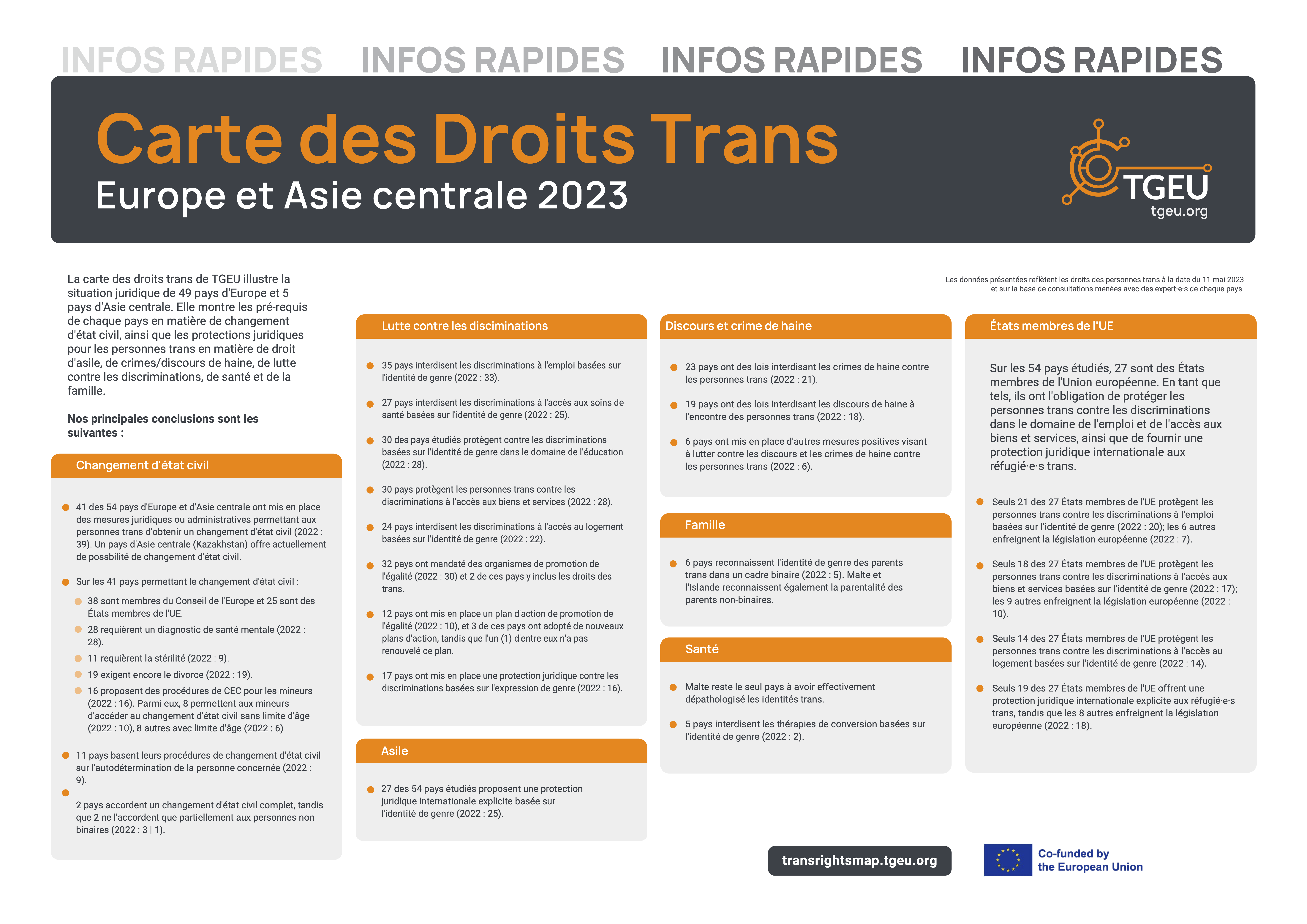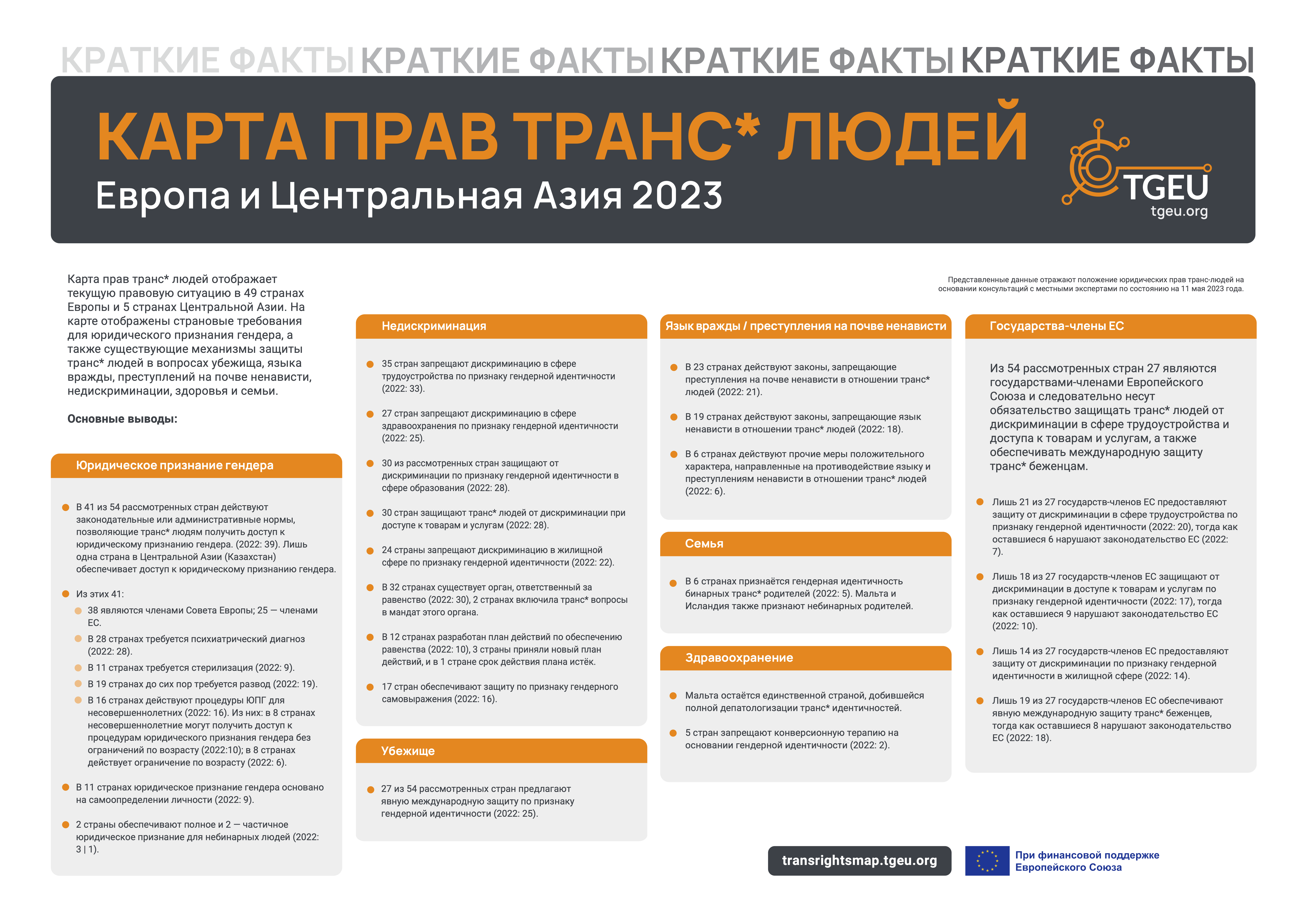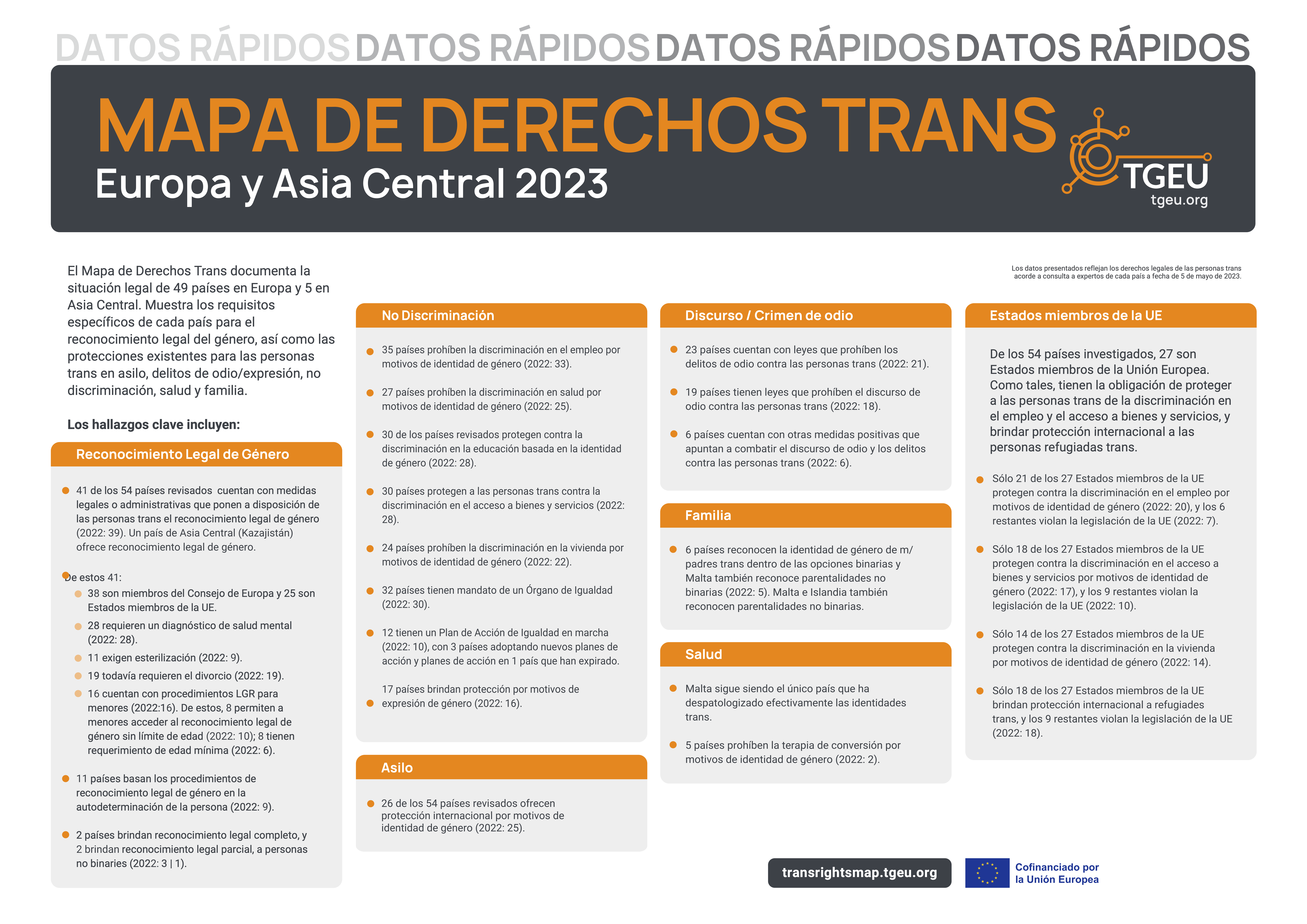Trans Rights Index & Map 2023: Continued Progress Amid Anti-trans Backlash in Europe & Central Asia

Today, we launch the latest version of our Trans Rights Index & Map. This launch marks a decade of our annual legal mapping research project on trans rights in Europe and Central Asia to empower trans communities to advocate for policy changes.
The past 12 months saw an increase in trans rights in the region on the whole, building on the return to progress in 2022. However, the risk of regression and anti-trans backlash is pressing at the same time. Some countries lost points in 2023, and are in danger of further regression. Slovakia particularly stands out, as they face a de-facto ban on legal gender recognition. Even with this backlash, more countries improved protections and human rights for trans people in 2023. Among them are Spain, Moldova, Andorra, Finland, and Iceland — with Iceland overtaking Malta at the top of the rankings.
Which countries increased trans rights?
Spain and Finland adopted legal gender recognition based on self-determination. Now, 11 countries follow a self-determination-based legal gender recognition model. Spain’s new law was particularly far-reaching. It also covers employment, protections for trans migrants, and discrimination on grounds of gender expression. However, non-binary people were left out of Spanish legal gender recognition, and trans youth were left out of Finland’s self-determination law.
Greece and Spain introduced new conversion therapy bans on grounds of gender identity. They join the small but growing list of countries in Europe to do so. Moldova made a number of changes to explicitly protect trans people from discrimination, hate crime, and hate speech. And, with Albania, 27 countries now mention gender identity in their asylum legislation. Kazakhstan regained the first point for any Central Asian country since 2020, as it is now possible to access necessary diagnosis certificates again. However, legal gender recognition procedures in Kazakhstan remain discriminatory with many pathologising restrictions.
Which countries removed trans rights?
Even with this progress, 2023 saw regression in Slovakia. This is due to inconsistent requirements for legal gender recognition, and a new bill threatens to outlaw it entirely. Despite its new law, Spain also lost a point for introducing a restrictive age limit on legal gender recognition.
Many EU Member States are also failing to meet their obligations to trans people. Eight still do not provide explicit asylum protection in the law– Bulgaria, Czechia, Denmark, Estonia, Hungary, Lithuania, Poland, and Romania – in violation of EU law. Further, all countries except Malta require a mental health diagnosis to access trans-specific healthcare. This is also required in 28 countries to change ID documents. Only Iceland and Germany provide full legal gender recognition for non-binary people. Denmark and Malta offer partial recognition.
“While this progress is encouraging, this massive data collection also highlights clear areas for improvement. Trans people ask governments to take immediate action. Trans individuals have the right to live free from violence and discrimination. For this they need strong investment in legal protections at national and regional levels. We urge civil society organisations, human rights defenders, and policymakers to stay alert and keep working together to create more inclusive societies, implement effective measures to combat violence and discrimination, and promote full respect for the human rights of trans individuals.”
Lenny Emson, Executive Director of TGEU
Freya Watkins, TGEU Research Officer, adds:
“Trans rights continue to advance, particularly in legal gender recognition, building on last year’s slow progress. But we cannot be complacent, as the current example of anti-trans backlash in Slovakia shows. Our data from the last ten years show that legal protections for trans people are on an upward trajectory in many policy areas. However, progress must come faster for the most marginalised trans communities, in particular trans youth, where rights are first to be restricted. We also need better protections for trans refugees and sex workers, as well as disabled and racialised trans people. Crucially, these legal protections must be implemented in practice.“
The Trans Rights Index & Map 2023 was presented on the 11th May at IDAHOT+ Forum 2023 in Reykjavik. Full trends over the past decade and detailed analysis will be released on the 17th May for the International Day Against Homophobia, Biphobia, and Transphobia 2023. Reach out to comms@tgeu.com to get exclusive early access to the data and insights.
In a hurry? Check out our Fast Facts
What is the Trans Rights Index & Map?
The Trans Rights Index & Map is the most comprehensive analysis of trans rights in Europe and Central Asia to date, spanning over a decade of data collection. Started in 2013, it now illustrates the legal situation of 54 countries in 30 areas of trans-specific legislation. Central Asian countries were added to the map in 2019. This year, TGEU’s research team added French and Croatian versions, to the previously available English, Russian, and Spanish. The map tracks six legal categories:
- Legal gender recognition
- Asylum
- Hate crime and speech
- Non-discrimination
- Health
- Family
The Trans Rights Index & Map is made in collaboration with ILGA-Europe and launches on the same day as ILGA-Europe’s Rainbow Map and Index 2023.
Press contact: comms@tgeu.org
Nadya Yurinova, Senior Communications Officer nadya@tgeu.org
Press release & visual assets: Download here
Disclaimer
The data presented reflects the legal rights of trans people based on consultation from in-country experts as of 11 May 2023. The Trans Rights Map documents existing explicit legal protections governments are granting (or denying) trans people. It does not claim to exhaustively portray the complex realities of trans people’s lives.
Acknowledgments
We would like to thank the 100+ country experts who shared their knowledge and expertise with TGEU.
The Trans Rights Map is developed in cooperation with ILGA-Europe.
The interactive Trans Rights Map was designed and developed by Wolfox Studio.
